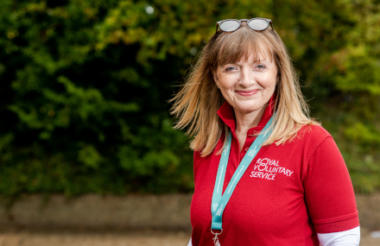The Royal Voluntary Service (RVS) attracted a “broader, more diverse” volunteer workforce during the pandemic, and this now needs to be kept engaged, its chief executive has said.
Catherine Johnstone, chief executive of RVS, was speaking at Civil Society Media’s Spring Summit yesterday, where she told delegates that “everybody needs to be incredibly proud” of the volunteer response to coronavirus.
RVS was commissioned by NHS England to create a volunteering app in partnership with technology company Good Sam, which led to over a million tasks being delivered by volunteers during the pandemic.
The charity has also surveyed volunteers about their experience and found that 84% of them had come into contact with people from different backgrounds and cultures.
“That's been one of the things that I really want to celebrate about working in the pandemic. We've had such a broader, more diverse, at every level, volunteer workforce,” Johnstone says. “Because people from all communities have stepped forward to support.”
Opportunity
Johnstone said that the sector now needs to seize the opportunity to build on enthusiasm for volunteering.
During the pandemic there were 4.6 million first-time volunteers, she said.
“They have volunteered from very different routes and very different communities, and therefore the diversity of my current volunteer workforce is much broader, much deeper, much richer than it was pre pandemic,” Johnstone said.
The next challenge is to maintain the momentum and keep people engaged.
“We have the opportunity to build a much stronger, much broader and much more diverse civic society,” she said.
“And unlike previous volunteer responses like the Olympics, we don't want to waste this opportunity. We don't want to make it hard for people to find their way into the next volunteer opportunity.”
She added that the country's recovery from the pandemic will mean a “long road ahead for many, many people”, so volunteers will still be needed to provide support.
She also said most volunteers think of themselves as local volunteers rather than national ones.
“Communities still need us, and therefore we need to keep those people engaged and motivated and enjoying their volunteering,” she said.
‘Misconception that we stole volunteers’
Elsewhere, Johnstone addressed what she described as the misconception about RVS’s role when it comes to coordinating community work.
“There were lots of issues in the early days about people saying we'd stolen all the volunteers,” she said.
However, in areas where there was already community volunteering happening, RVS's role was to act as a safety net and reach the most vulnerable, and this required a different kind of volunteer.
“This is a very different type of volunteering. It's a very responsive, very in the moment,” she said. “And what we've discovered is that volunteers really like being able to control when they switch their app on.”
Of the 750,000 who signed up to the app, 100,000 were not eligible because it was for England, so they were redirected to other services.
Others didn’t finish the sign-up process, or ever turn the app on to be available to volunteer. But of the 400,000 who turned it on, “all had jobs at one level or another”. Some people have completed over 1,000 tasks whereas others have done three or four, she said.
‘Digital is here to stay’
Coordinating the NHS Volunteer Responders app “felt like we were on a roller coaster and we were still building the track”, Johnstone said.
However, the app has shown good results. Nearly 100% of tasks are matched to volunteers within two hours.
RVS also found itself responding to more people than it anticipated as the pandemic brought to light people who had slipped through the net.
RVS also moved some of its other service to an online delivery model. For example, it expanded its Virtual Village Hall programme, which reached 4.6 million Facebook users.
“Digital innovation I think is here to stay, particularly around micro volunteering,” Johnstone says.
While micro volunteering “is not the panacea” she says, during the pandemic it was a “a new avenue that has now been expanded”.
It was also something that “actually volunteers are telling us they really like and the clients are telling us that they really like”.
Related articles











